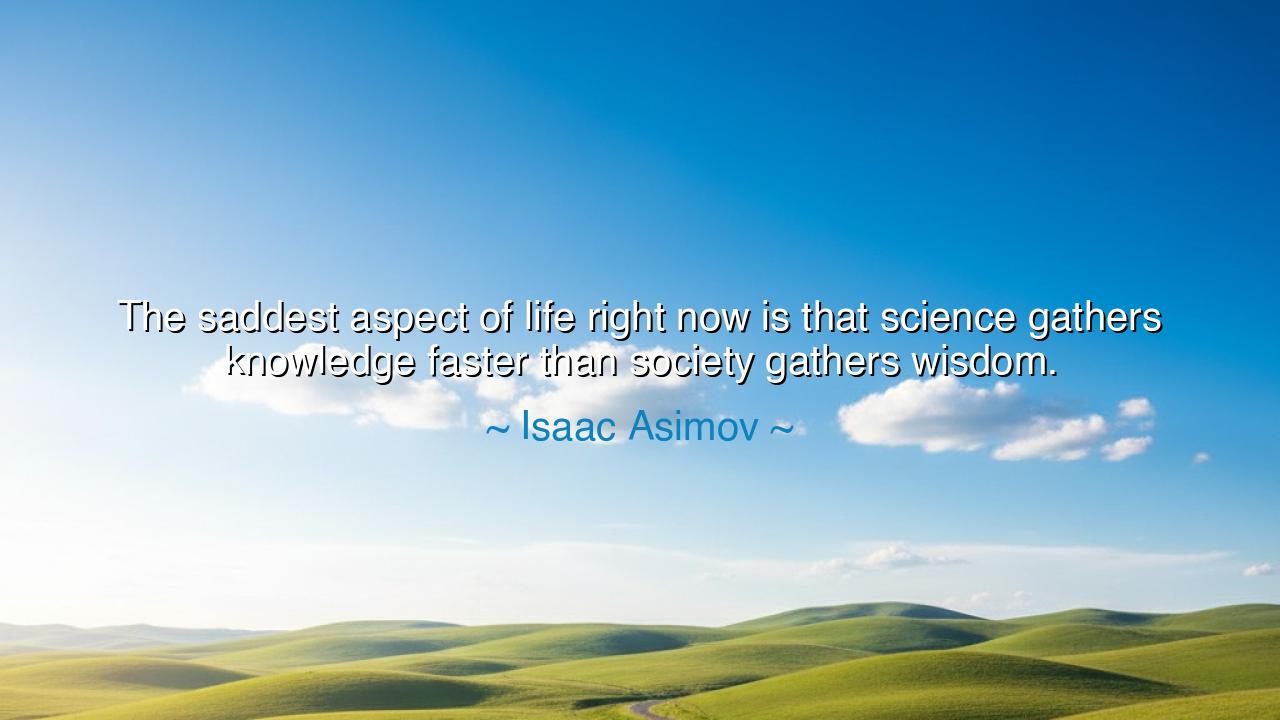
The saddest aspect of life right now is that science gathers
The saddest aspect of life right now is that science gathers knowledge faster than society gathers wisdom.






Hear, O children of the future, the solemn warning of Isaac Asimov, prophet of science and master of reason, who declared: “The saddest aspect of life right now is that science gathers knowledge faster than society gathers wisdom.” This is not the idle musing of a writer, but the cry of one who gazed upon the rising power of human invention and trembled at the weakness of human virtue. For Asimov saw clearly: to possess knowledge without wisdom is to place a sword in the hands of a child.
The origin of this saying lies in Asimov’s dual role as both scientist and storyteller. He marveled at the greatness of science, which could map the stars, split the atom, and unlock the code of life itself. Yet, as he wrote his many tales of future empires and machines, he foresaw the danger: that man’s ability to discover far outpaces his ability to govern himself. New powers arrive swiftly—technology, weapons, machines of vast intelligence—but the heart of society lags behind, slow to learn justice, compassion, and restraint. Thus, the scales tilt: knowledge rises like a flood, while wisdom lingers like a trickling stream.
Consider, O listener, the tale of the atom. In the early 20th century, scientists, with great curiosity, unlocked the secrets of nuclear fission. In laboratories, it was a triumph of knowledge, a marvel of human inquiry. Yet how quickly it was turned into weapons that scarred Hiroshima and Nagasaki with fire. Here Asimov’s words are revealed: science had given mankind a godlike power, but society had not yet gathered the wisdom to wield it with care. The knowledge ran ahead; wisdom stumbled behind.
Or reflect on the story of the Industrial Revolution. The steam engine, the factory, the machine—all dazzling inventions. But with them came child labor, poisoned air, and the suffering of millions in crowded cities. Again, knowledge outran wisdom. It took generations of struggle, the voices of reformers, the labor of law, and the compassion of leaders before society caught up, before the machine was harnessed for human dignity rather than human misery.
Asimov’s warning rings true in our own age. Computers, artificial intelligence, genetic engineering—these gifts of knowledge arrive with breathtaking speed. Yet society still wrestles with ancient hatreds, greed, corruption, and fear. We can build machines that think, but we cannot yet agree on how to live together as brothers. We can edit the genes of life, but we cannot yet cure the diseases of envy and pride. Thus the sadness Asimov saw is still ours: the swift horse of knowledge races ahead, while the lame mule of wisdom lags far behind.
The lesson is plain: if humanity would survive, it must hasten to gather not only knowledge, but wisdom. Wisdom does not come from laboratories alone; it is born of humility, compassion, reflection, and reverence for life. Without wisdom, knowledge becomes danger; with wisdom, knowledge becomes blessing. The two must walk together, lest mankind destroy itself by the very brilliance of its own discoveries.
Practical actions lie close at hand. Teach not only facts in schools, but virtues—justice, patience, and empathy. Encourage not only innovation in science, but reflection in philosophy and ethics. As individuals, do not pursue knowledge without asking: What good shall it serve? Who will it help? Whom might it harm? Let every discovery be weighed not only in terms of profit or power, but in terms of humanity and truth.
So let Asimov’s words echo in your heart: the tragedy of life is not in knowing too little, but in knowing too much without wisdom to guide it. Let us then labor to join knowledge with wisdom, discovery with compassion, invention with justice. For only then shall science be not a flood that drowns us, but a river that carries us to a brighter, nobler future.






AAdministratorAdministrator
Welcome, honored guests. Please leave a comment, we will respond soon